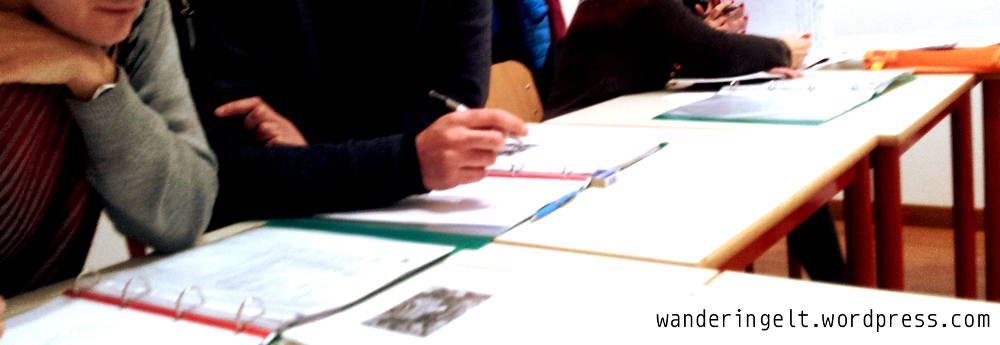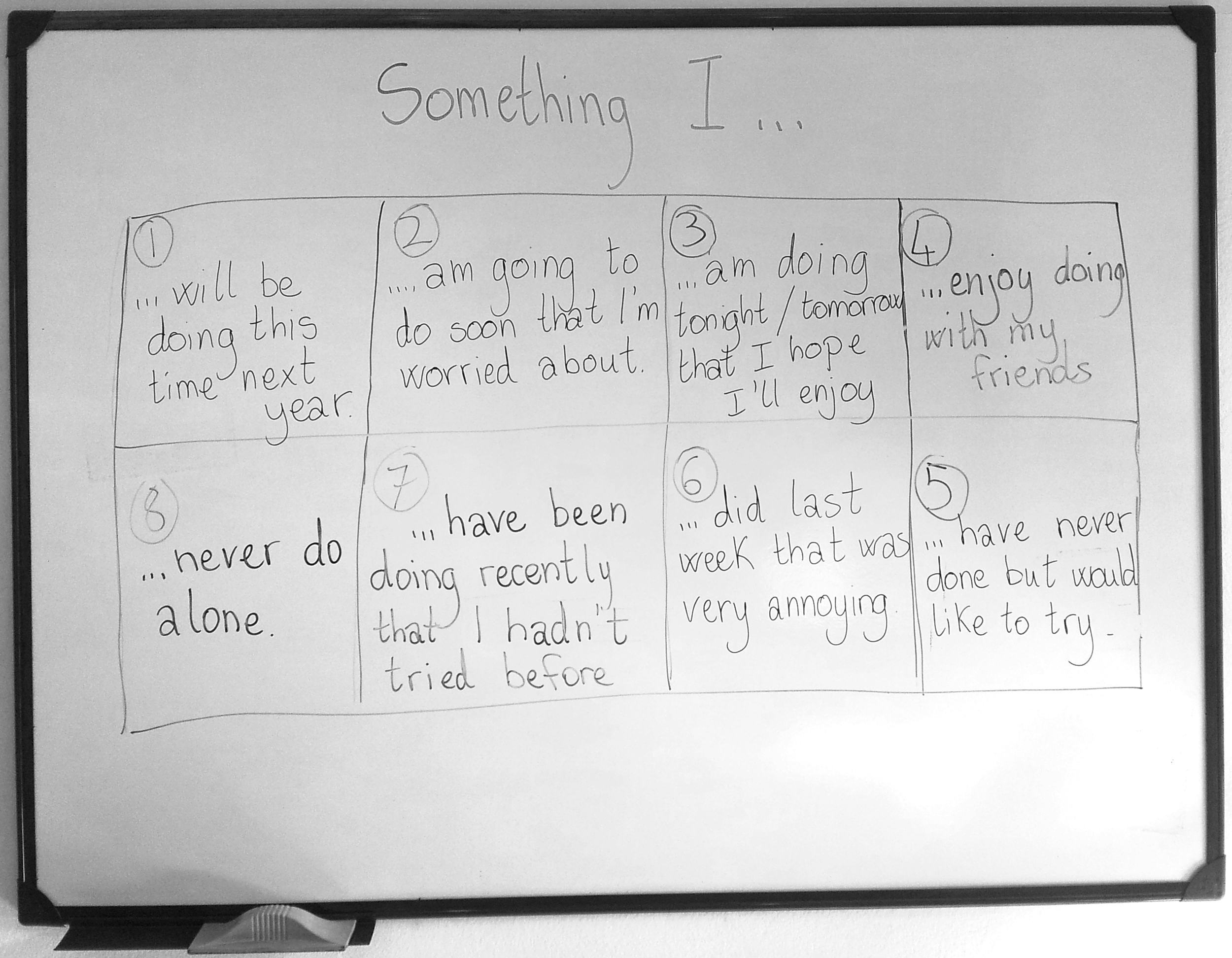I briefly mentioned on this post how I love activities which are materials-light and conversation-driven. I might not have acknowledged it fully, but I’m starting to suspect Dogme has seriously influenced my teaching ????. Anyway, last Sunday I tried to follow #AusELT chat on teaching materials-light, and even though I missed the time and couldn’t join the conversation, it still made me want to write about it.
I don’t know why, but ever since I teach, I have always dreaded the task of preparing teaching materials. I don’t mean handouts or worksheets, which I actually enjoy creating and adapting to my classes when I have the time to do it. I mean “extra” materials such as laminated cards, games, posters and the like. Continue reading “Materials-light teaching”
#ELTchat summary: Does technology motivate or distract in the classroom?
I am very proud and excited to post my very first #ELTchat summary here. I have been unable to follow previous chats live as I was always working, but this time with the slow-burn idea I was able not only to read, but also to participate in the chat as it was unfolding.
This week’s #ELTchat was inspired by a blog debate posted on the IATEFL LTSIG website: is technology helping students to develop skills, or is it distracting them from learning? The chat started on Wednesday 08/06/2016 at 19:00 BST and instead of finishing after one hour as usual, at 20:00 BST it went on ’slow-burn’ for 24 hours. In this way people with different commitments and time zones were able to join the conversation and add their comments at different times during a whole day. Continue reading “#ELTchat summary: Does technology motivate or distract in the classroom?”
Freedom in the classroom
This is the second of a short series of posts on the software I use everyday in my work. I already wrote about why I choose free software and what free software I use as a teacher here. Today I would like to focus on free software that I usually get or suggest my students to use. Continue reading “Freedom in the classroom”
How effective are conversation lessons?
Last weekend has been a nice, long one here in Italy. Most schools were closed for 4 days so I had plenty of time to relax, study and improve my Emacs skills (Manuel, I’m looking at you 😉 ). I also had time to reflect on my work and on many other things going on in my life at the moment.
I don’t know how often you teach what we call “conversation lessons”, but at my school these are pretty common. Many adult students have negative experience with state school, grammar-based teaching, so once they pay for the lessons themselves the most common comment is: “I want to learn to speak. I don’t need any grammar, I already studied it at school for many years. Is it possible to have conversation-only lessons?” Continue reading “How effective are conversation lessons?”
Freedom in the teacher's room
Today I would like to go a bit off topic and start a short series of articles about free software for teachers and students. I have seen many posts on what, how and when to use one software or another (the most commonly mentioned being Microsoft Office), so today I would like to add my contribution to this discussion.
Why free software?
First of all, let me clarify what free software is and why you should choose it over proprietary software (for a more detailed explanation see the gnu.org website). Free software is NOT software that you don’t have to pay. It is software that gives its users the freedom of transparency. You can use it and modify it as you please, copy and re-distribute it in any form and if you are a programmer you can see and modify its source code. These freedoms — which may seem useless to the non-specialist — actually have many implications for every user. Continue reading “Freedom in the teacher's room”
'Something I': a speaking activity
Today I would like to share with you an activity I love to do in both 1:1 and group classes. I love it because it has three very special ingredients that few activities have all combined:
- it’s flexible, it can be adapted to almost any level and any class;
- it’s fun, so far all my students, teenagers and adults, have enjoyed it;
- it’s materials-light and conversation-driven, which make it perfect for many different purposes (warm-up, speaking practice, tenses revision… More on this later on).
The activity, which I called Something I…, was inspired by reading Luke Meddings and Scott Thornbury’s Teaching Unplugged, and in particular by their activity Something we did (page 36). Here it is. Continue reading “'Something I': a speaking activity”
A NNEST and employer on the equity debate
I know I’m lagging behind on this topic as many bloggers and ELT professionals have already written and spoken extensively about it, especially after this plenary by Silvana Richardson at IATEFL 2016. And by the way, of all the things I’ve been reading on the topic, I particularly enjoyed this article by Marek Kiczkowiak and this slightly older one by Michael Griffin.
I’m sorry if I’m just repeating what other people have already written, but I feel very strongly about this issue, so I decided to write my thoughts anyway. What’s more, I am in a very peculiar position to comment on this as I am what you would define a NNEST and at the same time I have hired teachers to teach at my (tiny) language school, so I also have the employer perspective. Continue reading “A NNEST and employer on the equity debate”
Are we getting it all wrong?
I recently read a not-so-recent article about a group of UK teachers who went to China to try to understand the secret to the high performance of Chinese students in international tests. The alleged results came as quite a shock.
According to the article, the “traditional” methods used in China — the same that the West has been disregarding as useless, obsolete and counter-productive for decades — such as teacher presentation, memorisation and drilling, could be exactly the reason for Chinese students success in education.
If I draw to my personal experience, I remember when I was studying Mandarin in China: every teacher’s lesson started with reading and repeating vocabulary, then reading some sample dialogues or texts and memorising them in pairs. I remember hating that method and thinking how useless and boring it was for me as a student. Continue reading “Are we getting it all wrong?”
Considerations after one year of courses without a textbook
As I wrote at the beginning of this school year, we decided to try to experiment some courses without a textbook. The idea behind this was to give maximum flexibility and adaptability to the teacher and the course, so that it could be tailor-made for our very small groups.
The results were not as positive as I expected, but were not entirely negative. I’d like to report on what I discovered during this year, dividing the feedback into: feedback from students and feedback from teachers. Continue reading “Considerations after one year of courses without a textbook”
Year of the Monkey
The Chinese say that the monkey is a very clever, unpredictable animal. And 2016 is the Year of the Monkey. It has been unpredictable indeed. Many things have happened in my life, including a major career change.
I have left this blog idle for almost a year, busy as I was with all things of life. I now hope my new situation will allow me more time to post, to share ideas and to read and comment my favourite bloggers (including Sandy Millin, Antony Ash, Lizzie Pinard, Michael Griffin to mention just a few).
You can also find me on Twitter as @wanderingELT.








